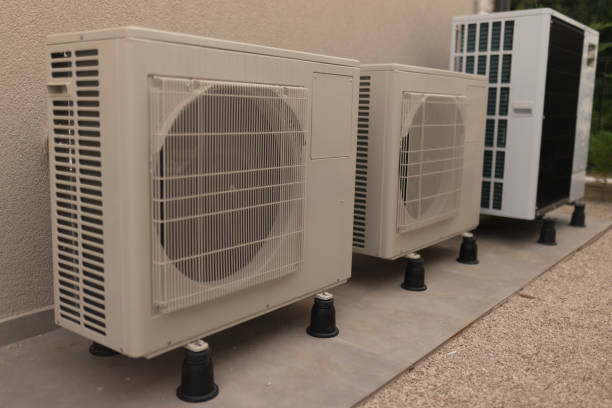AC Replacement in Greater Northdale, FL

When your AC struggles in Greater Northdale, FL, professional AC replacement restores comfort and efficiency. Learn key signs your system needs upgrading, such as age, frequent repairs, or high energy bills. The "$5,000 Rule" helps decide between repair and replacement. Our meticulous process includes precise system sizing, expert installation, and handling all permits. Understand new AC costs, ensuring a seamless, compliant installation for optimal home cooling.

Professional AC Replacement in Greater Northdale, FL
When the Florida heat becomes relentless, a failing air conditioner is more than an inconvenience; it's a threat to your comfort and well-being. For homeowners in Greater Northdale, replacing an aging or inefficient AC unit is a significant investment in your property and quality of life. A modern system not only restores powerful cooling but also enhances energy efficiency, improves indoor air quality, and provides reliable performance for years to come. Navigating this process requires professional guidance to ensure you select and install the perfect system for your home’s unique needs.
Telltale Signs Your AC System Needs Replacement
It can be difficult to decide between another repair and a full replacement. While a single breakdown may not warrant a new unit, a pattern of issues often indicates that your system is nearing the end of its operational life. Watch for these clear indicators:
- Age of the Unit: Most central air conditioners have a lifespan of 10 to 15 years. If your system is in this range, it's operating on borrowed time, and its efficiency has likely degraded significantly.
- Frequent and Costly Repairs: If you find yourself scheduling repairs more than once a year, the cumulative cost can quickly approach the price of a new installation. A new unit eliminates the cycle of constant breakdowns.
- Skyrocketing Energy Bills: An older AC has to work much harder to produce the same level of cooling, leading to a noticeable increase in your monthly utility costs. A new, high-efficiency model can lead to substantial long-term savings.
- Inconsistent Cooling and Hot Spots: If some rooms in your home are comfortable while others remain warm and stuffy, your AC may no longer have the capacity to distribute air evenly.
- Excessive Noise or Strange Odors: Loud banging, grinding, or rattling sounds can signal serious mechanical failure. Musty odors may indicate mold growth within the unit or ductwork.
- Use of R-22 Refrigerant: The production of R-22 refrigerant has been phased out due to environmental concerns. If your older system uses it, repairs requiring a refrigerant recharge will become increasingly expensive and difficult.
Deciding to Repair or Replace: The $5,000 Rule
A helpful guideline many homeowners use is the "$5,000 Rule." To use it, multiply the age of your AC unit in years by the estimated cost of the current repair. If the total is more than $5,000, replacement is generally the more financially sound option. For example, if your 10-year-old unit needs a $600 repair, the calculation is 10 x 600 = $6,000. In this scenario, investing that $600 into an aging system that is likely to fail again soon is less practical than putting it toward a new, reliable unit.
Beyond this simple rule, consider the long-term benefits. A new system comes with a manufacturer's warranty, offering peace of mind. Furthermore, the significant improvement in energy efficiency means your investment starts paying for itself immediately through lower electricity bills.
Our Meticulous AC Replacement Process
We believe in a transparent and thorough approach to ensure your complete satisfaction and optimal system performance. Our process is designed to be seamless and professional from start to finish.
1. In-Depth Consultation and Home Assessment:Our service begins not with a sales pitch, but with a comprehensive evaluation of your home. We inspect your existing system, assess the condition of your ductwork, and discuss your specific comfort needs and budget.
2. Precise System Sizing:One of the most critical steps is performing a proper load calculation, often using the Manual J methodology. This scientific approach considers factors like your home's square footage, insulation levels, window placement, and local climate. Proper sizing prevents issues caused by oversized or undersized units, ensuring maximum efficiency and dehumidification.
3. Selecting the Right Air Conditioning System:We guide you through the options, explaining the benefits of different systems and trusted brands like Trane and American Standard. We’ll help you understand SEER (Seasonal Energy Efficiency Ratio) ratings, so you can choose a unit that balances upfront cost with long-term energy savings.
4. Expert and Professional Installation:Our certified technicians handle the installation with precision and care. This includes the safe removal and disposal of your old unit, meticulous connection of the new system, proper refrigerant charging, and thorough testing of all functions. We work efficiently to minimize disruption to your home and ensure every component operates flawlessly.
5. Final Walkthrough and System Familiarization:Once the installation is complete, we conduct a final walkthrough with you. We demonstrate how to operate your new thermostat, explain the system's features, and answer any questions you may have about its performance and maintenance.
Understanding the Cost of AC Replacement
The cost of a new air conditioning system in Florida is influenced by several key factors. We prioritize transparency by helping you understand what contributes to the final investment. These factors include:
- Unit Size (Tonnage): Larger homes require more powerful units, which affects the price.
- Energy Efficiency (SEER Rating): Higher SEER-rated units cost more initially but provide greater energy savings over time.
- System Type and Brand: The choice between a standard central AC, a heat pump, and brands like Trane or American Standard will impact the cost.
- Ductwork Modifications: If your existing ductwork needs repairs or resizing to accommodate the new system, this will be factored into the project.
- Installation Complexity: The specifics of your home’s layout can influence the labor required for a successful installation.
Handling Permits and Ensuring Compliance
In Florida, a permit is required by law to replace an HVAC system. This regulation ensures that the installation is performed safely and according to state and local building codes, protecting you and your property. Our team manages the entire permitting process on your behalf. We handle all paperwork and coordinate inspections, ensuring your new system is fully compliant and installed to the highest standards of safety and quality. This commitment gives you peace of mind, knowing the job is done right.










